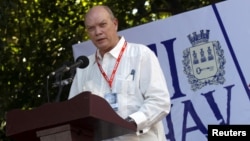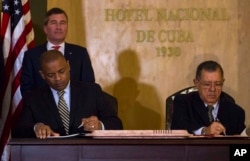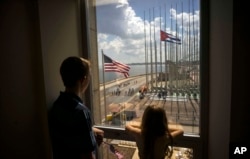Cuba’s foreign trade minister called for an end to the decades-old U.S. embargo Tuesday, saying his country welcomed the return of American business interests.
“The blockade doesn’t allow American companies to come freely to Cuba to make business; that’s a problem,” Rodrigo Malmierca Díaz, Cuba’s minister of foreign trade and investment, said in a news conference at the U.S. Chamber of Commerce in Washington.
The visit marked the first time in decades that a senior level Cuban official had spoken at the business federation.
The United States and Cuba advanced a number of business deals this week, including signing an agreement that would allow U.S. commercial airlines to significantly increase the number of flights to Cuba and granting permission for a U.S. company to build a tractor factory on the island.
Malmierca said American businesses are welcome in Cuba and would be “treated as any other company around the world.” He called the U.S. Treasury Department authorization of the factory license “a very interesting possibility,” but said it is only the first step in a series of negotiations between the American company and Cuban enterprises. The factory is expected to employ local Cuban workers.
“I hope it is not going to be a single decision,” Malmierca said, noting that many other American companies have visited Cuba and are waiting on licenses from the Treasury Department.
The two governments are doing their best working with a “very complicated sanctions regime,” said Jodi Bond, vice president for the Americas at the Chamber of Commerce, who joined Malmierca at the news conference.
Bond said that until sanctions are ended, the United States will “continue to see our foreign competitors access the market, while we’re not.”
Progress has been made, but U.S. companies still face significant obstacles to operating in Cuba.
“The Cuban government is a very bad borrower,” said Mike Gonzalez, a senior fellow at the Heritage Foundation, a research institution. “It has never paid back a debt; it has not paid back its debts to the Paris Club, to Russia, to Japan, to anybody who has loaned it money.”
Gonzalez said Cuba’s credit history, combined with the strict sanctions regulations still in place, will likely dissuade American businesses from operating in Cuba, despite this week’s developments.
“U.S. companies will realize that they have to proceed very cautiously and they will not do anything against the law,” said Gonzalez.
U.S. President Barack Obama and Cuban President Raul Castro restored diplomatic ties between the two countries in 2014 and formally re-opened embassies in Havana and Washington last year.
The U.S. presidential election in November will likely have a strong bearing on the development of business relations between the two countries.
Gonzalez noted the presence of Cuban-Americans Ted Cruz and Marco Rubio in the race, but said any one of the Republican candidates would likely strengthen the embargo “until the dictatorship allows the people of Cuba to vote.”
Malmierca said bilateral relations have progressed too far to go backwards.
“No matter if the president is from one party or the other, there’s a need to normalize the relations between Cuba and the United States,” he said.






